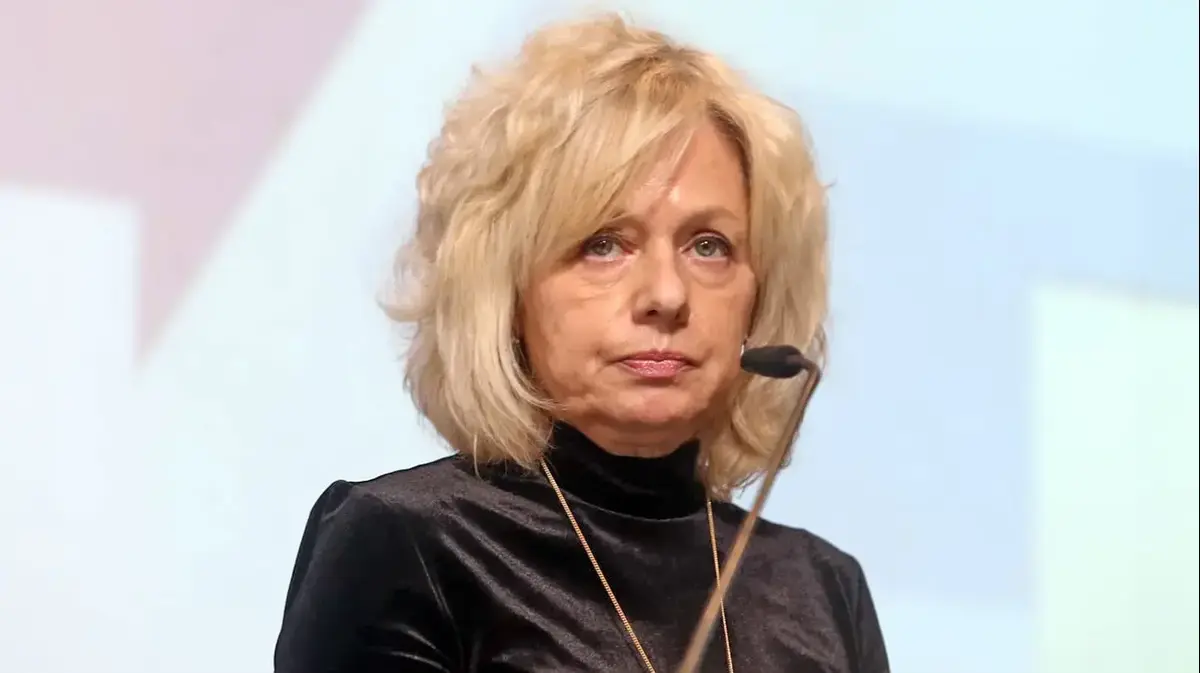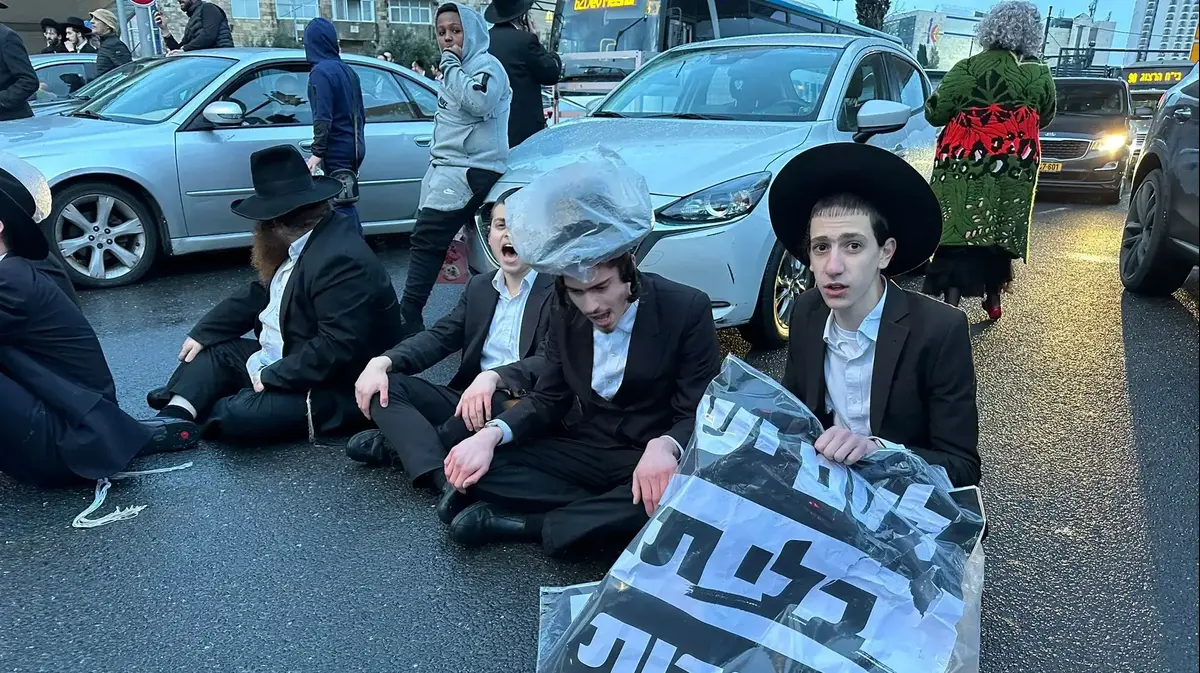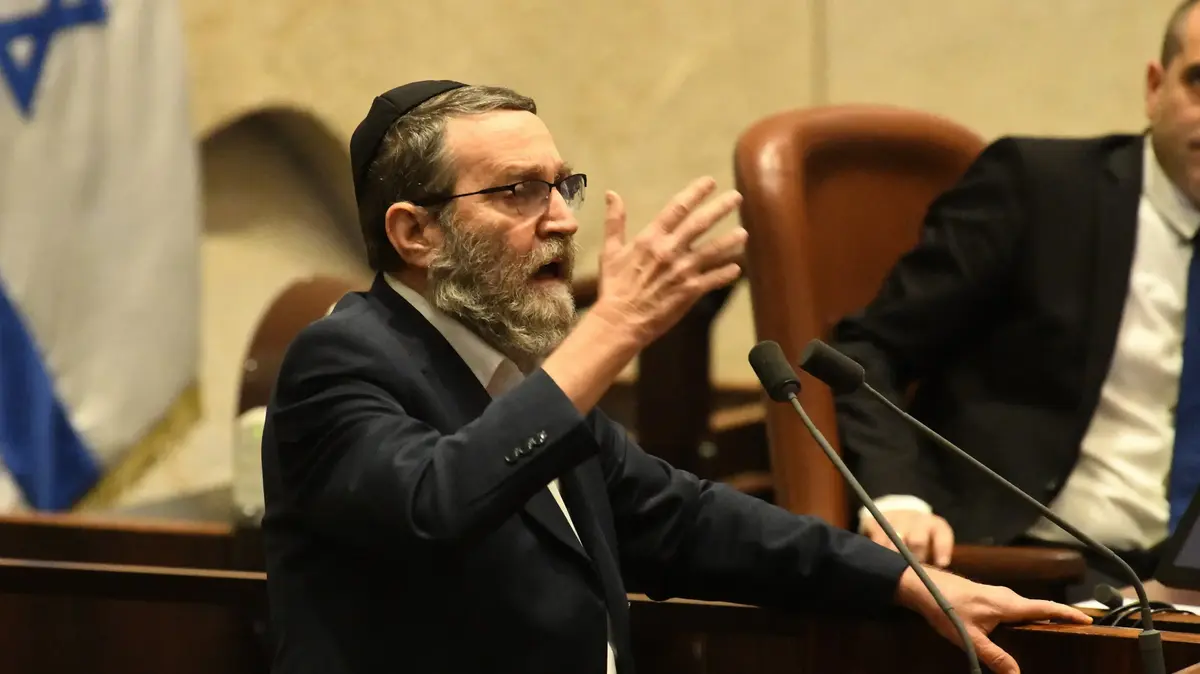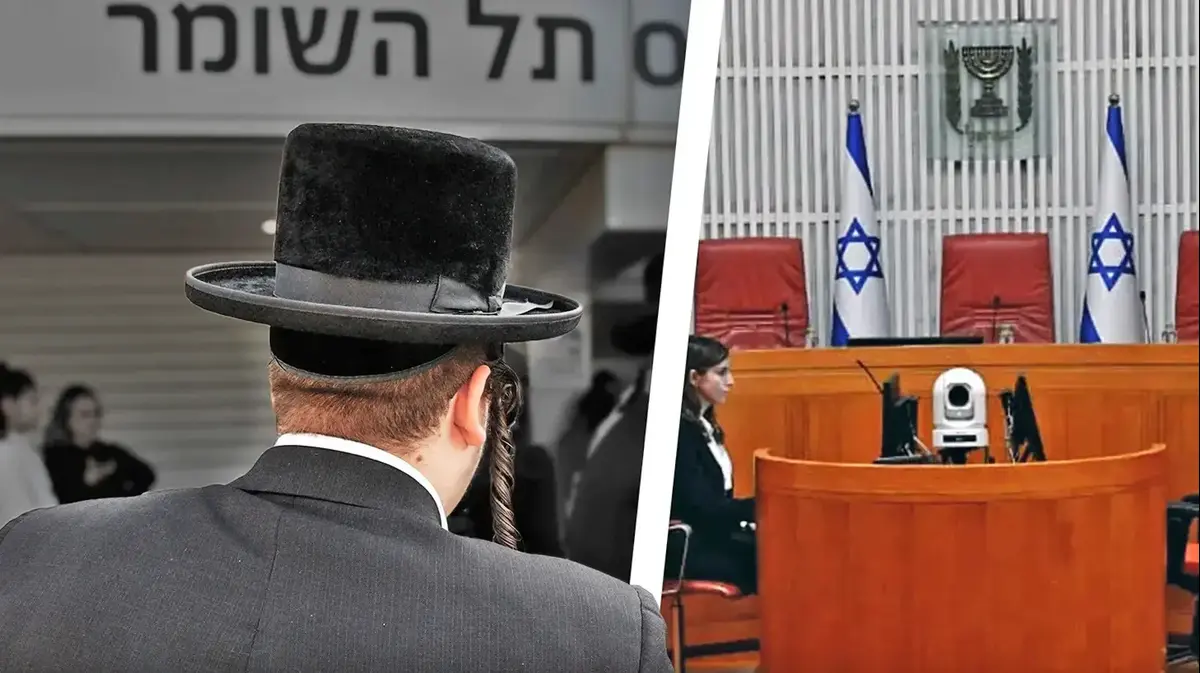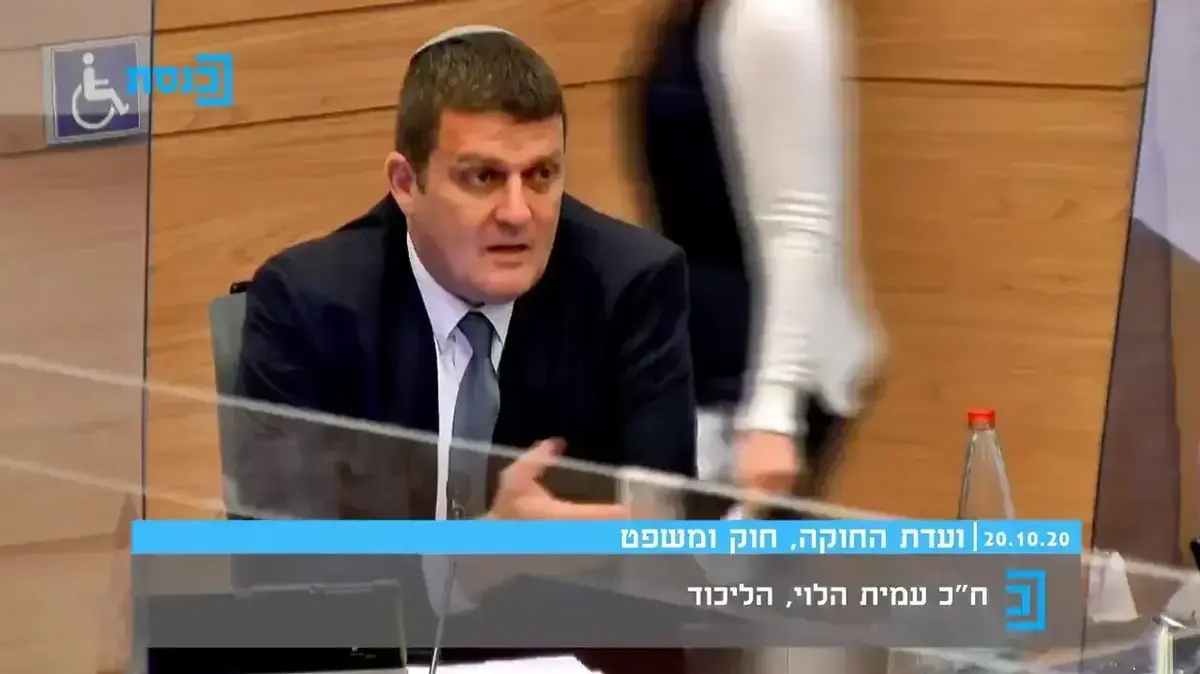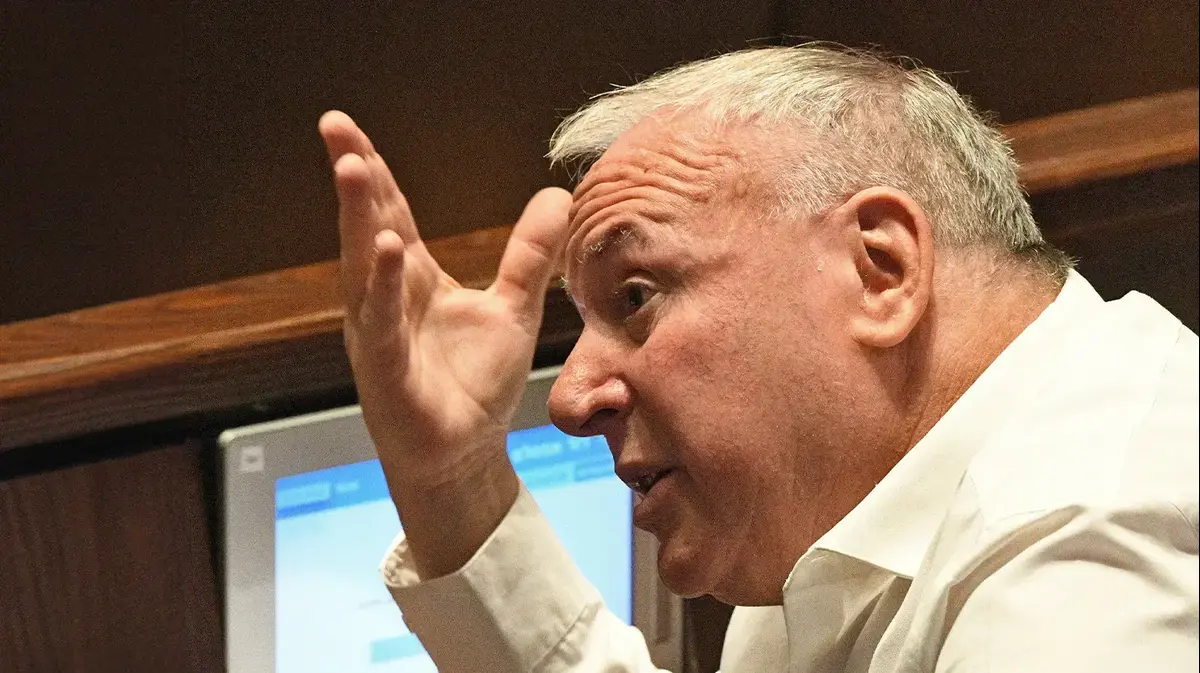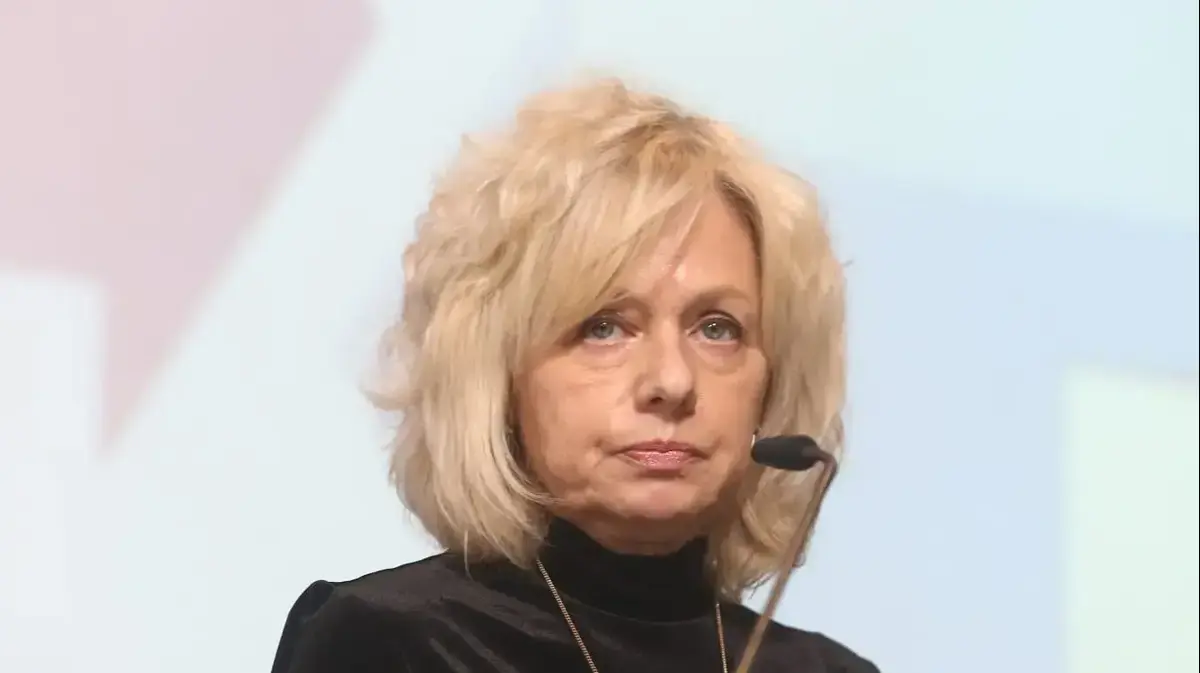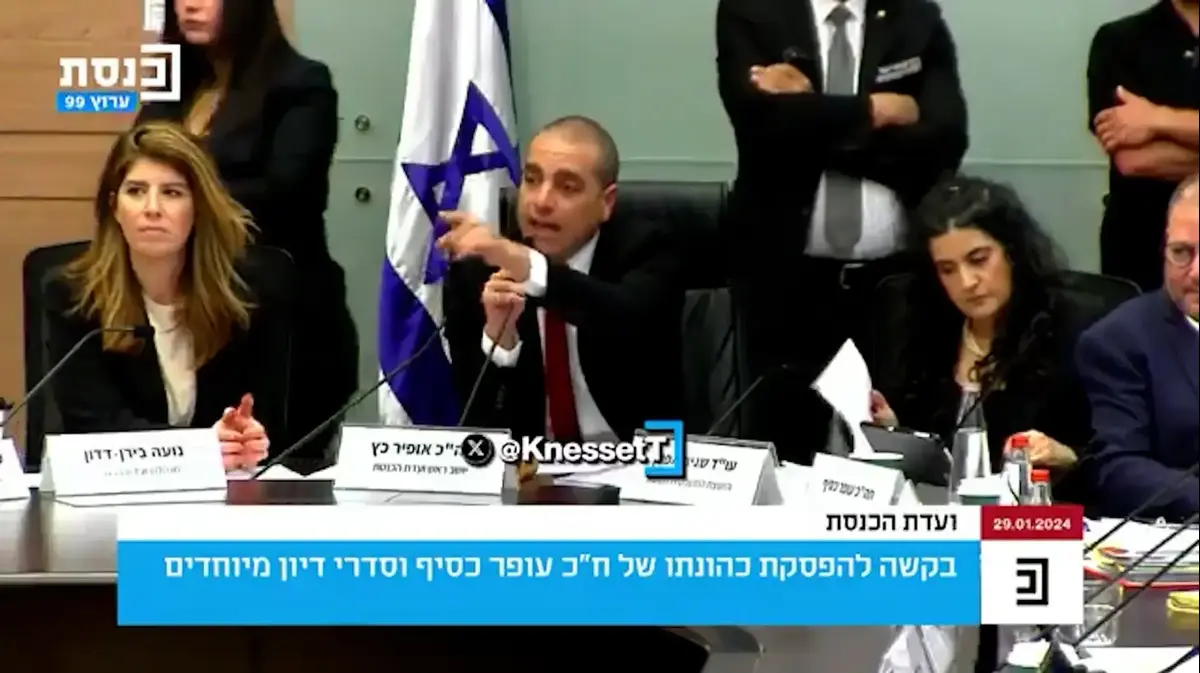The year is 1984. A young student who has just finished her military service in Unit 8200 makes her way to the red building of the Faculty of Law at Tel Aviv University. The target is one of the most difficult courses in the faculty, "Banknote Law" by the young lecturer who has just returned from a doctorate at Yale University - Manny Mautner. At the beginning of the month, December 2022, the roles were changed. It was Prof. Mautner who made his way to the office of the one who was a student at the time, and was later elected to be the legal advisor to the government - Gali Baharv-Miara.
"It was my first year on the faculty, with a class of 140 students," recalled Prof. Mautner in a conversation with Israel Hayom, "there were two outstanding students that I still remember to this day. One of them was Gali Beharev. In the years that have passed since then we have not met, but I followed her progress through the media, and I was happy that she reached very senior positions in the State Attorney's Office. I think she is an excellent appointment for Legal Advisor to the Government. She is a lawyer of the highest level and also a decent, firm and strong person, and these two things are exactly what is required for the position."
In February of this year, the government approved the appointment of Beharev-Miara, and her office already understands that "this is where it begins."
That the calm, the first ten months in her position that passed without too many legal challenges, is the calm before the storm.
This week, three of Speaker Miara's seven successors - Avital Sompolinsky, Gil Limon and Amit Marari - appeared in the Knesset with the aim of trying and intercepting the bills intended to enter the law book in a flash procedure: the Deri Law, the Smotrich Law and the Ben Gabir Law. After Netanyahu's government is sworn in, The coalition partners, as well as senior members of the Knesset in Likud, will begin to press for revolutionary reforms in the judicial system, which have been stalled during all the years of his rule.
In recent months, Miara met with a long list of senior lawyers.
She often works from Tel Aviv, ironically, from the Office of the Audit Commissioner for the Prosecutor's Office, staffed for many months only by a deputy.
Newspaper clippings with articles about the previous commissioner, Judge David Rosen, the one who declared that without reforming the audit body, the body is redundant, are still on the front desk.
When one of the lawyers asked Miara if she was afraid that the Knesset members' calls for Petra to be fired would materialize, she smiled a little, and to his testimony she replied something like this: "It's not that simple to fire a legal adviser to the government, but fine, if they want to - let them fire. What's certain is that there isn't The pressure that would make me resign. I knew where I was getting into, I'm satisfied with my job and I'm not going anywhere."
When asked what she was afraid of anyway, she replied: "Being less with the grandson."
A drop in standards
Those around the consultant look with concern at the proposed reforms in the legal system.
A senior jurist who met with her said: "We talked about a lot of issues. In my impression, she will prevent an override clause by a majority of 61 in any way, she will kill herself over it."
A senior in consulting and legislation, who works with the consultant, also says that "it is true, from the consultant's point of view, such an overreaching clause is really the end of democracy. There are no limits to the legislator, and the High Court has lost the ability to protect human rights."
Miara's surroundings confirmed this.
Enacting a superseding clause by a majority of 61 will lead the ombudsman to state that there is a legal impediment, despite the fact that this is an amendment to the basic law.
Miara did not experience the pressure and protests that Mandelblit experienced.
For her, reaching the verdict with the Netanyahu cases.
If Netanyahu again turns to ask for a settlement, he will be examined like any citizen who asks for it
The constitutional culture bothers the ombudsman. Unlike Britain, for example, in Israel no "constitutional practice" has been accepted, and in the absence of a constitution and when there are basic laws that are enacted and can be repealed by a simple majority, there is no "It's Not Done" characteristic. There are no red lines, and the Israeli system lacks protections on human rights. So, for example, a person was convicted in a third party and in large parts of the public this has no weight and he was elected to the Knesset.
Miara sees the standards go down.
According to her approach, she will impose a legal impediment when the legislator crosses the bright red line.
On the other hand, it will not prevent legislative initiatives that would embroil Israel in the Hague or cause Israel to be expelled from the OECD.
It will not save the government from itself.
The High Court's limitation to invalidating a law with an expanded composition and a privileged majority, for example 13 judges out of 15, is extremely problematic in Miara's eyes, although she will oppose it less than a superseding clause with a majority of 61. In her opinion, the legislator is limiting the restrictions that still exist. In addition to this, in the Ministry of Justice It is expected that the Supreme Court will be more and more conservative due to appointments like Ayelet Shaked and similar appointments in the future. She told the government ministers who spoke with her that it would be better to establish a public committee with professionals from various fields and politicians, to build the basic law: the legislation that will regulate the judicial system.
"climbed a tall tree"
Miara was born in Givatayim in 1959 to Shlomit, a painter, and Emanuel, one of the Palmach fighters in the rise of the state, the commander of the religious department who participated in many battles, and later - like his daughter Gali - served in intelligence. Miara has a sister, attorney Anat Beharve-Kern, municipal ombudsman Herzliya. In 2016, Anat authorized the municipality to operate public transportation on Shabbat for free, and the then interior minister, Aryeh Deri, tried to stop it without success. Ironically, in September of this year, the outgoing Minister of Transportation, Rav Michaeli, accused Speaker Miara of preventing her from operating transportation public on Shabbat in Israel.
After her service in 8200, Miara completed her master's degree in law at Tel Aviv University in 1990.
Four years later, she began working in the Tel Aviv District at the State Attorney's Office, in the field of non-criminal civil law.
Over the years she climbed the ranks of the civil service and in 2007 was appointed district attorney until 2015.
Many in the Ministry of Justice believe that the criterion that led Sa'ar to torpedo the appointment of Nazri and promote Miara, is the plea agreement with Netanyahu.
An associate of Sa'ar claims that "he estimated that it would be difficult to pressure her."
Saar denies
At the Tel Aviv District Attorney's Office, she met Gideon Sa'ar, who also served as an attorney in the department.
The two maintained a professional relationship, and when Sa'ar was appointed Minister of the Interior on behalf of the Likud, he appointed Miara as the chairman of a committee in the ministry whose job it is to examine the suitability of candidates for municipal corporations. In 2022, at the end of the term of the Ombudsman Mandelblit, Miara was placed as a public representative on the committee that selected his senior assistant of Mandelblit and the person closest to him in the office, Dr. Gil Limon, to the position of deputy ombudsman in Dina Zilber's place.
During her time as the District Attorney of the Tel Aviv District, Miara was considered a tough administrator. The veterans of the prosecutor's office tell of one case in which she discovered that one of the prosecutor's offices was chronically late in submitting cases she was managing, and when she caused losses of millions of shekels to the state, she hid it. Miara worked vigorously to get her fired, but the experience This one is blocked.
Haifa University
"I remember that she was assigned an unreasonable caseload," recalled a senior prosecutor at the time, "I argued that if the main problem was administrative, she could not be fired. It was not simple because Miara insisted."
Another senior official at the prosecutor's office, who was privy to the matter, said that "the dismissal was avoided because the attorney was pregnant in the first place, but I felt that Miara was climbing a high tree. After all, a few years earlier there was a more serious incident, in which the attorney did not submit state positions, and we received a ruling in the labor court that required the state by many millions. We tried to overturn the verdict, it came to the point that Moshe Lador, who was then the Jerusalem district attorney before being appointed the state attorney, was cross-examined at the court. This story reached the High Court.
So if in the worst case we didn't fire him - in the worst case he died?
Miara had a hard time getting down from the tree."
In contrast to the two, another former senior official in the prosecutor's office presents a different picture: "Miara, as a district attorney, was demanding, worked long hours in the public interest and made similar demands to the prosecutors under her. I thought the demand for dismissal was justified. We want district attorneys who don't just hang out in the corridors and whom everyone seems to like Each other, but also those with management skills, who dare to fire, something that, unfortunately, to this day does not exist in the prosecutor's office."
In any case, the attorney in question is still in her position in the Tel Aviv district and is evaluated by the district attorney, Liora Havilio.
to challenge the prosecutor's office
When the war began between the prosecutor's office and the commissioner for auditing the organization, Judge Hila Gerstel, Yara refused to join the combatants' trenches and supported the establishment of the commission.
Behind the scenes, she kept in touch with Gerstel, according to a lawyer who was close to Miara at the time.
As a lawyer, she managed significant cases.
Thus, for example, in the lawsuit of a convicted felon who was sentenced to prison, and who claimed that his interrogation by the commander of Yaha, the late Ephraim Bracha, caused him damages while severely infringing his rights.
Miara conducted long evidentiary hearings, but in the end the state lost and paid compensation to the offender.
Another case was the defamation suit filed by former Prime Minister Ehud Olmert against former State Attorney Moshe Lador, for things he said about him in an interview.
Lador had to apologize, but without compensating Olmert.
Miara also dismissed many claims by Palestinians who demanded compensation from the State of Israel.
The prosecutor's office estimates that Netanyahu is waiting to see how the High Court will act with Deri's law regarding the issue of defamation.
They think that if the High Court acts conservatively and does not intervene in the amendment, the next in line will be the Netanyahu law
In 2016, she finished her work at the prosecutor's office and joined the law firm Tadmor Levy & Co. as a consultant.
It was also there that Miara had the opportunity to deal with the affairs of the state, when after Operation Tzuk Eitan she wrote an opinion defending Benny Gantz and Amir Eshel from a claim for damages filed in a Dutch court by a Palestinian whose family members were killed in the operation.
Her opinion was accepted, and the claim was dismissed.
Towards November 2021, Miara's cell phone rang, and she was asked to come to the office of Justice Minister Gideon Sa'ar.
"I want you to apply for the position of ombudsman," he surprised her. It was clear to Miara that her answer would be positive, but she asked for a few days to consult with her children, who work in high-tech companies. After she informed Sa'ar that she was ready to run, he took her to a meeting with the then prime minister , Naftali Bennett, who gave her his support.
"The problem was that the Deputy Ombudsman, Raz Nazri, was running against Miara, a strong candidate that the members of the search committee might have seen as more suitable, and recommended him to the government and not Gali," says an associate of Gideon Sa'ar who dealt with the issue, "We also knew that Minister Shaked told Bennett that Nazri was better , and let it be a gamble to bring Nazri and Mayara to the government head-to-head, despite Bennett's support for her."
The search committee disqualified Nazri and forwarded Miara and two other candidates to the government's decision.
The member of the committee, MK Zvi Hauser, sought to ensure Miara's election and tried to convince the chairman of the committee, retired Supreme Court President Asher Grunis, to recommend only her to the government.
Grunis, who was in the minority and believed that Miara was not at all qualified for the position, refused.
After her selection, several members of the committee called Nazri to apologize.
Many in the Ministry of Justice and those around him believe that the criterion that led Sa'ar to torpedo his appointment and promote Miara is the plea agreement with Netanyahu.
Sa'ar's close associate, who dealt with the affairs of the search committee, says that "Socially, Miara is far from Netanyahu's center of influence - secular, Ashkenazi, not connected to the rabbis nor to Bays, and therefore Saar estimated that it would be difficult to pressure her regarding a plea deal. The fact that Mandelblit is rooted in Netanyahu's base brought The same to harm the investigations and later strive for a lenient settlement, while compartmentalizing the prosecution team. When the Netanyahu files were examined, Nazri believed that the 2000 case as well as the 4000 bribe should be closed and only the breach of trust left. He will open the negotiations with Netanyahu's lawyers from a softened position."
The insider further explains that "Gali did grow up in the prosecutor's office, but she was essentially not part of the Office of the Prosecutor, she is not part of their lineage and therefore can challenge them."
In the Sa'ar environment, they vehemently deny that a plea deal for Netanyahu was a consideration in Miara's choice.
A senior in consulting and legislation rejects the explanation and says that "Liat Ben Ari does not have a synagogue either and she does not belong to Netanyahu's base, and look what they do to her. You can be made 'Nir Orbach' even if you don't have a kippah."
Yes, investigate
What, then, is Miara's approach to settling an argument with Netanyahu?
There are voices that call for an end to the trial due to the public struggle it brought with it.
The previous prosecutor, Mandelblit, really wanted to end the trial with a relatively lenient plea deal. Miara has a completely opposite approach.
In her opinion, the approach in favor of a plea agreement sends a message that public corruption should not be investigated, and certainly not of a sitting prime minister, simply because it leads to a lot of mess.
Unlike Mandelblit, Miara did not experience the pressure and protests that he experienced.
For her, to reach the finish line of the verdict with the Netanyahu files.
If Netanyahu again turns to ask for a settlement, he will be examined like any citizen who asks for it.
Being prime minister, in her view, does not give him an advantage.
Security officials asked Miara to prevent Ben Gvir from going up to the Temple Mount.
She rejected most requests.
When Minister Bar-Lev issued instructions restricting the ascent of Jews to the mountain, Miara stated that the restrictions were illegal
The Prosecutor's Office estimates that Netanyahu is waiting to see how the High Court will act with the Deri Law - an amendment to the basic law that allows him to overcome the stigma issue.
They think that if the High Court acts conservatively and does not intervene in the amendment to the Basic Law, the next in line will be the Netanyahu Law. That is, a plea deal will be signed, but after that the government will work to enact an amendment to the Basic Law, which will allow it to overcome the stigma of the conviction in the plea deal.
One of Miara's first tasks in the position was to study the files of the elves.
For days she read the testimonies and went over the main evidence.
When she finished, one of her assistants asked her if she would have made the same decision as Mandelblit.
Miara answered him, "That's not the question at all, the cases are ongoing. The question is not whether I would also file charges, but whether I believe in them now, and the answer is yes, of course."
Miara is updated from time to time on what is happening in the Jerusalem districts, but leaves the main handling of the case to State Attorney Amit Isman, his deputy Liat Ben Ari and the prosecutors Yehudit Tirosh and Alon Gildin.
Just last Thursday she held a meeting with the Alfis case team after Ben Ari returned from an assignment abroad.
When the district judges in Jerusalem rejected the prosecution's request to amend the indictment against Netanyahu, the prosecutor issued an unusual announcement, according to which she decided not to pursue the decision. Jurists criticized the announcement, since it is not possible to pursue interim decisions in the criminal trial at all. The prosecutor's office was also embarrassed by this Those around the consultant say that indeed, before the announcement came out, there was a discussion on whether to petition the High Court, and it was decided to avoid it.
Splitting - without politics
Since she took office, the investigation reveals that there has been a sharp decrease in the number of governmental corruption cases that are brought to her attention from Lahav Unit 433 in the police, as well as a decrease in the intelligence materials that flow to the enforcement authorities regarding elected officials.
In the consultant's environment, two possibilities are raised - one is that the many cases from the Mandelblit era deterred the political ranks, and a second, and problematic, possibility is that the struggles of the elected officials in the enforcement authorities bore fruit and deterred Lahav's investigators and detectives.
Last week, the ombudsman visited Lahav after a meeting with the commander of the investigation and intelligence division in the police, who dealt with the low amount of cases and information. During the tour, she met with all the commanders of the divisions and talked with them about the issue. .
Jurists who met with Miara said that she expressed a position against splitting the role of the ombudsman. In her view, the split is nothing more than a title that does not say what, and the essence is in the how. Justice ministers who began to deal with the split were convinced to abandon the idea, but in Sa'ar's environment they put a different picture regarding Miara: "Gali was elected on the basis that the position would be split, this was explicitly brought up in the meetings between her and Sa'ar and she told him that she would not oppose it.
This was a condition that was placed on her and was also placed on Amit Isman before he was elected state attorney.
Both took office knowing that Sa'ar would take away from them the ability to make decisions in the cases of elected officials."
For many months, Sa'ar and the director general of the office, Eran Davidi, worked on the bill to split the ombudsman, which is the result of meetings with many senior lawyers.
Sa'ar submitted the proposal to the ombudsman, but then the coalition was shaken following the resignation of Idit Silman, so that Meira was spared from presenting her position on the issue.
The proposal to split Sa'ar's role as ombudsman reached Israel Hayom, according to which the ombudsman's authority to approve investigations and submit Indictments against elected officials will be taken from him, but will not remain in the hands of the prosecutor's office.
In Sa'ar's bill, there is a committee whose members will be a retired ombudsman, a retired judge and a defense attorney, and they are the ones who will make the decisions in cases involving elected officials, and the prosecutor's office will be subordinate to them in these cases. In addition, the ombudsman's office will cease to advise the government on the rights of suspects and accused persons. And the legal advice to the government on these issues will be transferred to an independent unit in the Ministry of Justice.
Sa'ar planned to obtain the support of the government and the ombudsman in the summer and enact it in the winter session of the Knesset. Miara, as mentioned, did not hold a discussion on Sa'ar's proposal, but her general approach is that the government has the authority to make structural changes in the position of the ombudsman - as long as it is clear that the change does not weaken the Law enforcement and that a mechanism will be maintained to ensure proper and non-political appointments.
Her objection was justified in many ears by the fact that the legal advisor is a moderating factor in the face of the speeding attorney's office, which does not know the work of the government, does not know politics, and may criminalize normative behaviors.
This is not only a principled approach, but also a daily one: in the eight months in which Miara has been in office, she has managed to reject several police investigation requests regarding elected officials.
"Enables an ombudsman"
When Miara was elected to the position, it was argued against her that she lacked knowledge and experience in the criminal field.
The criticism is not in a vacuum, since, in the report of the Shamgar Committee which examined the institution of the Attorney General, it was determined that "the Attorney General serves as the head of the general prosecution, and hence his expertise in the field of penal law is required", an expertise that Miara does not have.
Attorney Yochi Gansin, one of the leading female jurists in the civil service, and in her most recent position the ombudsman of the prison service, rejects the criticism: "Lack of experience in the field of criminal law does not make appointing a person as ombudsman to the government unqualified or inappropriate.
Not every jurist can be distinctly knowledgeable in all areas of law - civil, criminal and constitutional-administrative - just as an expert in the field of orthopedics is not an expert in another field of medicine, for example cardiology.
Because of this - the working processes of the ombudsman are such that he works in a structured and orderly manner with a team of mediators, each of whom is an expert in the various fields of law, and dozens of jurists serve under them, each of whom brings his own professional baggage.
"Prof. Aharon Barak was also appointed ombudsman for the government when his 'forte' was civil law, and only when he took office - he became an expert even in the field of constitutional and administrative law.
The former ombudsman, Prof. Yitzhak Zamir, was also not a 'criminalist', but an expert in constitutional-administrative law at the time; and State Attorney Amit Isman also dealt exclusively in criminal law throughout his legal career, but in his current position he is also responsible for the Department of Criminal Justice. Zim and the civil department at the prosecutor's office.
Miara worked for decades as an active and senior lawyer in the attorney's office and dealt in a wide variety of legal fields, and has a rich professional record.
This is not a second-rate lawyer with no professional experience.''
In the range between activist and conservative, in the environment of the outgoing Minister of Justice Sa'ar, Miara is defined as a "moderate conservative".
Those around her testified that she would do her utmost to allow the government to implement its policy, within the limits of the law.
"She's an enabler, that's her world view," says one of the government ministers, "her working method is currently giving power to the changers, and she mixes less with ministers, but when she's in the picture - the starting point, as I got the impression, is to allow action.
By the way, in my opinion it is more possible than Mandelblit.
Maybe it's because it's her first year and maybe it's a world view.
I think it's also because as soon as the Netanyahu investigations began, Mandelblit went on the defensive.
Gali does not live the Prime Minister's files, it is a project of her predecessor, she is not there emotionally."
However, Miara does not recognize the need to make changes, certainly not in-depth reforms in the legal system, other than the enactment of a basic law: the legislation whose main purpose is to anchor the existing situation.
Many criticisms were leveled at Miara on the grounds that she serves the government that appointed her, and especially Gideon Sa'ar.
She is not exposed to social media, her aides refer her to Twitter tweets from time to time, but she mainly consumes the established press.
Those around her reject the criticism and say that the incoming government will receive the same treatment and its policies can be examined over time.
Miara Balma several law memos that Sa'ar asked to distribute in preparation for legislation.
One of them, who is related to Netanyahu, even led to a difficult conversation between them.
In Sa'ar's environment they say that they do not remember a difficult conversation, but confirm that there were arguments about the legal obstacles that the ombudsman imposed on his memos.
between the essential and the formal
This week Miara came out against the Ben Gabir law, which gives more powers to the Minister of National Security, and her successors even met with him to try to soften it.
Miara knows Ben Gabir mainly from security intelligence information, and several meetings were held in her office with security officials who asked her to prevent him from going up to the Temple Mount, as well as prevent him from being in the neighborhood of Shimon the Righteous (Sheikh Jarrah) in Jerusalem.
She rejected most of the requests of the security bodies.
When the Minister of Internal Security, Amr Bar-Lev, issued instructions restricting the ascent of Jews to the mountain, Miara stated that the restrictions were illegal.
Already in the first six months of the ombudsman's position, a decision was recorded in her account that provoked intense public criticism and also from the High Court.
It was when Prime Minister Yair Lapid asked to appoint a Chief of Staff, and due to an urgent security need, Miara approved him to do so during an election period. The opinion did not refer to what later became clear - that the appointment of a Chief of Staff requires the approval of the Committee for the Appointment of Senior Officials, but the position of chairman The committee is not staffed.
In the opinion of the ombudsman, which was revealed for the first time in Israel Hayom, Miara approved for the purpose of appointing a chief of staff during an election period to also appoint a chairman of a committee during an election period, and stated that the appointment would be for eight years, so that it would tie the hands of the incoming government contrary to the rules of restraint and restraint Applies to a government during an election period. Retired Supreme Court judge, Manny Mazuz, was the one who was designated for the position.
Miara, whose opinion according to existing law is binding on the government, did not present alternatives, such as for example that the appointment would be for the Chief of Staff's approval only.
During the hearing at the High Court, the judges tried to imply that her opinion was wrong and contrary to the rules outlined by the Office of the Ombudsman itself.
After Miara insisted on fortifying her position, the High Court issued a ruling criticizing her legal conduct.
This is not the first time that the High Court rejects the opinion of the ombudsman.
When the Knesset began the process of enacting the regulation law, Mandelblit announced that there was a legal impediment to the law, but that it was possible to regulate settlements in the Yosh using a less predatory tool, in his opinion, called the "market regulation". The government nevertheless enacted the law, and in the end, the High Court Invalidated both the law and the outline in Mandelblit's opinion at the High Court of Mitzpe Karemi.
Another storm caused by Miara arose following her speech at the Bar Association conference in September of this year - the "essential governance speech".
As part of it, the ombudsman said that "in recent years there have been voices claiming that the rule of law harms governance, or stands in opposition to it.
I completely disagree with this statement.
Governance and the rule of law are the same.
In this context, a distinction must be made between formal or technical governance and substantive governance.
Formal governance may look at one and only one point of view - is the government effective in realizing its goals, or in other words: is it possible for the elected echelon to realize the will of the majority.
Substantial governance, on the other hand, holds the concept that governing power is not exercised in a vacuum, but within a value framework.
Prof. Asher Cohen from Bar-Ilan University was among the respondents, saying: "Just as Barak's 'substantial democracy' (that is, everything that the court decides) prevails and is superior to 'formal democracy' (that is, what the Knesset or the government that represents the will of the majority decide) - so the 'substantial governance' (only everything the ombudsmen say is allowed or forbidden to do in order to govern) will be superior to the 'formal governance' (everything that needs to be done to govern effectively within the framework of the law).
And where is the responsibility for what will happen?
The responsibility will of course be assigned solely to those responsible for the formal governance, who will be limited by those responsible for the substantive governance, who will not have any responsibility for their decisions."
Lt. Col. Yedidia Zuckerman, chairman of the Israel Cities Organization, explains that while many citizens suffer from the lack of governance by the enforcement agencies in their territory, the Ombudsman chose to deal with restrictions on governance that does not exist at all: "Apparently there is a connection between living in a prestigious neighborhood and talking about Substantial governance.
The residents of the State of Israel, groaning under the burden of protectionism and living in the shadow of criminal and nationalist terrorism, are crying out for basic governance that will restore their personal security.
The talk of 'substantial regulations' points to a deep and sharp disconnection from everyone who lives outside the Ramat Gan-Givataim border.
The role of the justice system at this time is to strive and find solutions for equal law enforcement, to deter and restore governance and security to the residents of Israel."
were we wrong
We will fix it!
If you found an error in the article, we would appreciate it if you shared it with us


